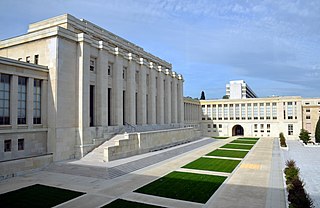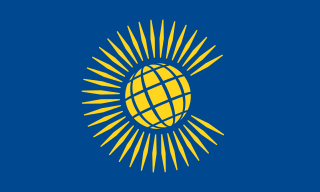Related Research Articles

The Council of Europe is an international organisation founded in the wake of World War II to uphold human rights, democracy and the rule of law in Europe. Founded in 1949, it has 46 member states, with a population of approximately 675 million; it operates with an annual budget of approximately 500 million euros.

The Commonwealth of Independent States (CIS) is a regional intergovernmental organization in Eurasia. It was formed following the dissolution of the Soviet Union in 1991. It covers an area of 20,368,759 km2 (7,864,422 sq mi) and has an estimated population of 239,796,010. The CIS encourages cooperation in economic, political and military affairs and has certain powers relating to the coordination of trade, finance, lawmaking, and security. It has also promoted cooperation on cross-border crime prevention.

The Maldives has remained an independent nation throughout its recorded history, save for a brief spell of Portuguese occupation in the mid-16th century. From 1887 to 1965, the country was a British protectorate while retaining full internal sovereignty. At its independence in 1965, the Maldives joined the United Nations on 20 September.
The Harare Commonwealth Declaration was a declaration of the Commonwealth of Nations, setting out the Commonwealth's core principles and values, detailing the Commonwealth's membership criteria, and redefining and reinforcing its purpose. The Declaration was issued in Harare, Zimbabwe, on 20 October 1991, during the twelfth Commonwealth Heads of Government Meeting. It reaffirmed the political principles laid out in the Singapore Declaration of twenty years before, and is considered one of the two most important documents to the Commonwealth's uncodified constitution, until the adoption of the Charter of the Commonwealth in 2012.

The GUAM Organization for Democracy and Economic Development is a regional organization of four post-Soviet states: Georgia, Ukraine, Azerbaijan, and Moldova.

Digital rights are those human rights and legal rights that allow individuals to access, use, create, and publish digital media or to access and use computers, other electronic devices, and telecommunications networks. The concept is particularly related to the protection and realization of existing rights, such as the right to privacy and freedom of expression, in the context of digital technologies, especially the Internet. The laws of several countries recognize a right to Internet access.
Charter 97 is a declaration calling for democracy in Belarus and a pro-human rights news site taking its inspiration from the declaration. The document – the title of which deliberately echoes the Czechoslovak human rights declaration Charter 77 20 years earlier – was created on the anniversary of a referendum held in 1996, and which, in the words of the organization of the same name, declares:
"devotion to the principles of independence, freedom and democracy, respect to the human rights, solidarity with everybody, who stands for elimination of dictatorial regime and restoration of democracy in Belarus".
A people is any plurality of persons considered as a whole. Used in politics and law, the term "a people" refers to the collective or community of an ethnic group or nation. The term "the people" refers to the public or common mass of people of a polity. As such it is a concept of human rights law, international law as well as constitutional law, particularly used for claims of popular sovereignty.
The Vienna Declaration and Programme of Action (VDPA) is a human rights declaration adopted by consensus at the World Conference on Human Rights on 25 June 1993 in Vienna, Austria. The position of United Nations High Commissioner for Human Rights was recommended by this Declaration and subsequently created by General Assembly Resolution 48/141.

The criteria for membership in the Commonwealth of Nations, which apply to current and prospective member states, have been altered by a series of documents issued over the past eighty-two years.

The Community for Democracy and Rights of Nations, also commonly and colloquially known as the Commonwealth of Unrecognized States, rarely as CIS-2, is an international organization in Eastern Europe uniting several states in the former Soviet Union, all of which have limited to no recognition from the international community.

The Republic of Artsakh is a republic with limited recognition in the South Caucasus region. The Republic of Artsakh controls most of the territory of the former Nagorno-Karabakh Autonomous Oblast. It is recognized only by three other non-UN member states, Abkhazia, South Ossetia and Transnistria. The rest of the international community recognizes Artsakh as part of Azerbaijan. In November 2012, a member of Uruguay's foreign relations committee stated that his country could recognize Nagorno-Karabakh's independence. In 2012, Armenia and Tuvalu established diplomatic relations and it was expected that Tuvalu may recognize Artsakh's independence. In October 2012, the Australian state of New South Wales recognized Nagorno-Karabakh. In September 2014, the Basque Parliament in Spain adopted a motion supporting Artsakh's right to self-determination and in November 2014, the Parliament of Navarre, also in Spain, issued a statement supporting Artsakh's inclusion in taking part in settlement negotiations.

The Charter of Human Rights and Responsibilities Act 2006 is an Act of Parliament of the state of Victoria, Australia, designed to protect and promote human rights.

Kamalesh Sharma is an Indian diplomat. He was the fifth Secretary General of the Commonwealth of Nations from 2008 to 2016, having previously served as the High Commissioner for India in London. He has served as the Chancellor Emeritus of Queen's University Belfast.

An international organization or international organisation, also known as an intergovernmental organization or an international institution, is a stable set of norms and rules meant to govern the behavior of states and other actors in the international system. Organizations may be established by a treaty or be an instrument governed by international law and possessing its own legal personality, such as the United Nations, the World Health Organization and NATO. International organizations are composed of primarily member states, but may also include other entities, such as other international organizations, firms, and nongovernmental organizations. Additionally, entities may hold observer status.
The Universal Declaration on Animal Welfare (UDAW) is a proposed inter-governmental agreement to recognise that animals are sentient, to prevent cruelty and reduce suffering, and to promote standards on the welfare of animals such as farm animals, companion animals, animals in scientific research, draught animals, wildlife and animals in recreation.

The Commonwealth of Nations, simply referred to as the Commonwealth, is a political association of 56 member states, the vast majority of which are former territories of the British Empire. The chief institutions of the organisation are the Commonwealth Secretariat, which focuses on intergovernmental aspects, and the Commonwealth Foundation, which focuses on non-governmental relations among member states. Numerous organisations are associated with and operate within the Commonwealth.

The 2011 Commonwealth Heads of Government Meeting, commonly known as CHOGM 2011, was the 22nd Meeting of the Heads of Government of the Commonwealth of Nations. Held in Perth, Western Australia, between 28 and 30 October 2011 and hosted by the Prime Minister Julia Gillard.

The political status of Puerto Rico is that of an unincorporated territory of the United States. As such, the island of Puerto Rico is neither a sovereign nation nor a U.S. state. Because of that ambiguity, the territory, as a polity, lacks certain rights but enjoys certain benefits that other polities have or lack. For instance, in contrast to U.S. states, Puerto Rico residents cannot vote in U.S. presidential elections nor can they elect their own senators and representatives to the U.S. Congress. On the other hand, in contrast to U.S. states, only some residents of Puerto Rico are subject to federal income taxes. The political status of the island thus stems from how different Puerto Rico is politically from sovereign nations and from U.S. states.

The 2013 Commonwealth Heads of Government Meeting was the 23rd Meeting of the Heads of Government of the Commonwealth of Nations. It was held in Colombo, Sri Lanka, from 15 to 17 November 2013. Commonwealth leaders agreed on Sri Lanka as the 2013 host for the meeting when they met in Port of Spain, Trinidad and Tobago, in 2009. Sri Lanka, which was originally slated to host the summit in 2011, was accused of committing atrocities during the Sri Lankan civil war and the summit was instead held in Perth, Australia; Colombo was given the 2013 summit instead. The leaders of Canada, Mauritius, and India boycotted the summit, citing alleged human rights violations by Sri Lanka against its Tamil minority. Protests were also banned during the summit. President Mahinda Rajapaksa summarised the summit's events as: "Issues covered in the communique include development, political values, global threats, challenges and Commonwealth cooperation." However, the meeting was overshadowed by controversy over Sri Lanka's human rights record and the alleged war crimes during the final stages of the civil war. This was the first time in 40 years that the Head of the Commonwealth, Queen Elizabeth II, was not present at the CHOGM.